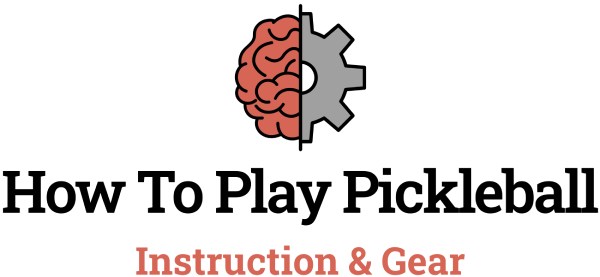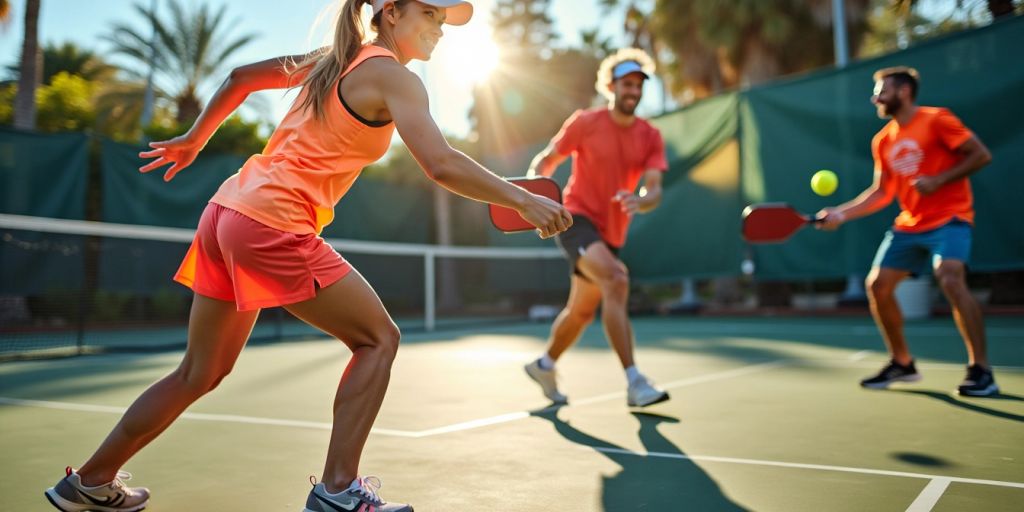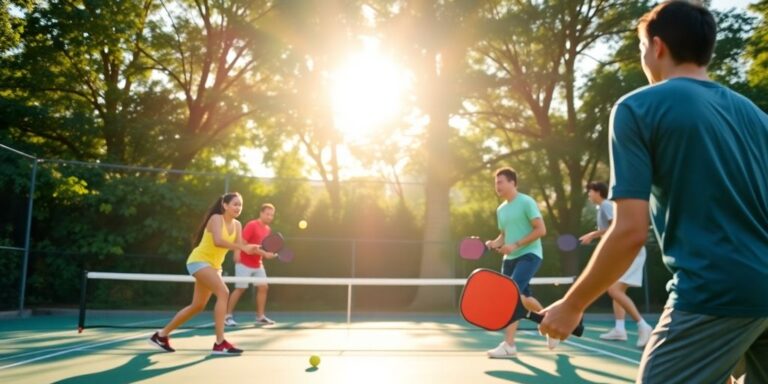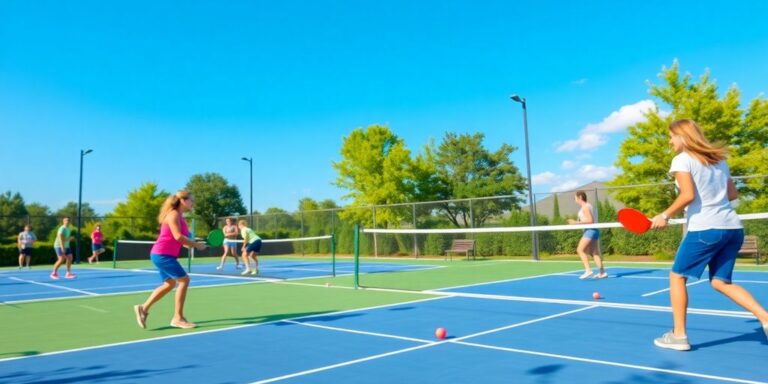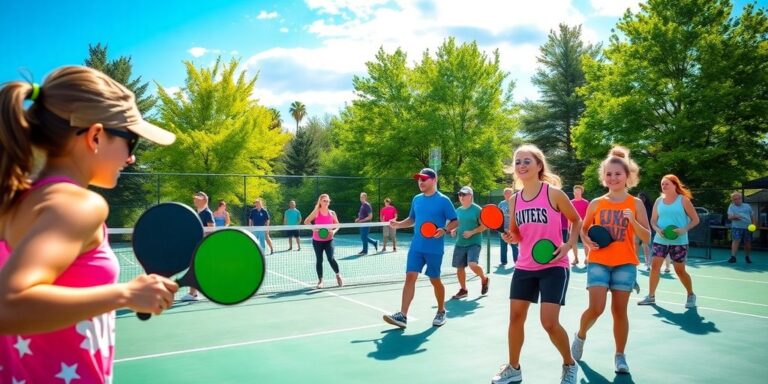Pickleball is a fun and exciting sport that combines elements from tennis, badminton, and ping pong. Whether you’re just starting out or looking to sharpen your skills, understanding key strategies can elevate your game. This guide covers essential techniques, strategies, and tips to help you play pickleball like a pro, no matter your skill level.
Key Takeaways
- Master the basics: Focus on serving, dinking, and footwork to build a strong foundation.
- Practice consistency: Keeping the ball in play is more important than hitting hard shots.
- Communicate with your partner: Clear communication is vital for effective teamwork during doubles.
- Understand shot placement: Aim your shots at your opponent’s weak spots to gain an advantage.
- Warm up and stay positive: Physical and mental preparation can enhance your performance on the court.
Essential Pickleball Techniques for Beginners
Mastering the Serve
The serve is a key part of pickleball. A deep serve keeps your opponent back, making it harder for them to attack. Here are some tips for a great serve:
- Use an underhand or topspin serve.
- Focus on your grip and paddle placement.
- Aim for the opponent’s backhand to limit their options.
Learning How to Dink
Dinking is a soft shot that lands in the kitchen area. It’s important for controlling the game. To improve your dinking:
- Keep your paddle angle open.
- Use a gentle touch and soft grip tension to place the ball.
- Aim for your opponent’s weak spots, low in the kitchen.
Practicing Your Footwork
Good footwork helps you get into the right position for each shot. Here are some footwork tips:
- Stay light on your feet.
- Practice quick side-to-side movements, stay square to the net.
- Always be ready to move forward or backward.
Developing a Solid Backhand
A strong backhand can surprise your opponents. To enhance your backhand:
- Practice hitting against a wall.
- Focus on your grip and follow-through.
- Use your body to generate power, not just your arm.
Remember, practice is key! The more you play, the better you’ll get. Enjoy the game and have fun!
Intermediate Strategies to Elevate Your Pickleball Game
To take your pickleball skills to the next level, focus on these intermediate strategies that can enhance your gameplay:
Mastering the Soft Game
Mastering the soft game is crucial for keeping your opponents off balance. This involves:
- Practicing dinks and drop shots to control the pace of the game.
- Aiming for precision rather than power to place the ball where your opponent struggles.
- Using soft shots to create openings for more aggressive plays.
Placement Over Power
Instead of just hitting the ball hard, focus on where you place it. Here are some tips:
- Target the sidelines to stretch your opponent.
- Aim for their weak spots, like their backhand.
- Use angles to make it harder for them to return the ball.
Transitioning from Defense to Offense
Recognizing when to switch from defense to offense can change the game. Consider these points:
- Look for opportunities to attack when your opponent is out of position.
- Be ready to move quickly and take control of the point.
- Practice drills that help you identify these moments during play.
By focusing on these strategies, you can improve your overall performance and enjoy the game even more. Remember, consistency is key in pickleball, so keep practicing!
Advanced Pickleball Tactics for Competitive Play
Mastering the Third Shot Drop
The third shot drop is a key tactic in advanced pickleball. This shot involves gently placing the ball just over the net into the kitchen area. By doing this, you force your opponents to hit the ball upwards, giving you a chance to take control of the rally. Here are some tips for mastering this shot:
- Focus on a soft touch to ensure the ball lands in the kitchen.
- Practice your timing to make sure you execute it effectively.
- Use this shot to set up your next move.
Utilizing Spin Variations
Adding spin to your shots can make them unpredictable. Here are some types of spin you can use:
- Topspin: Helps the ball dip quickly, making it harder for opponents to return.
- Backspin: Causes the ball to slow down and bounce lower, disrupting your opponent’s rhythm.
- Sidespin: Curves the ball, making it difficult to predict its path.
Strategic Shot Placement
Placing your shots in the right spots can give you a big advantage. Focus on:
- Targeting your opponent’s weak areas on the court.
- Hitting shots to the sidelines to stretch their reach.
- Keeping your opponents guessing by mixing up your placements.
Effective Communication with Your Partner
In doubles play, communication is crucial. Here are some ways to improve it:
- Call out your shots to avoid confusion.
- Discuss strategies before the game to ensure you’re on the same page.
- Use hand signals during play to indicate your next move.
Mastering these advanced tactics can significantly enhance your game. Remember, practice makes perfect!
Improving Your Pickleball Consistency and Control
Keeping Your Shots Low and Controlled
To enhance your game, keeping your shots low and controlled is essential. This strategy minimizes your opponent’s chances of making a strong return. Here are some tips to achieve this:
- Focus on the angle of your shots.
- Maintain control to dictate the pace of the game.
- Aim for specific areas on the court to create winning opportunities.
Focusing on Consistency Over Power
When starting out, it’s crucial to prioritize consistency rather than power. Here’s how:
- Aim to keep the ball in play.
- Force your opponents into making mistakes, especially during long rallies.
- Practice regularly to build muscle memory and improve shot accuracy.
Enhancing Your Hand-Eye Coordination
Improving your hand-eye coordination can significantly impact your performance. Consider these exercises:
- Hit a ball against a wall to improve reaction time.
- Use a smaller paddle or larger ball for added challenge.
- Engage in drills that mimic game situations to boost your skills.
Consistent practice is key to mastering your shots and improving your overall game. By focusing on these areas, you can elevate your pickleball skills and play like a pro!
Physical and Mental Preparation for Pickleball
Importance of Warm-Ups and Drills
Before stepping onto the court, warming up is crucial. It helps prevent injuries and prepares your body for the game. Here are some effective warm-up exercises:
- Dynamic stretches: Arm circles, leg swings, and torso twists.
- Footwork drills: Ladder drills to improve speed and agility.
- Practice serves: Get comfortable with your serve before the match.
Building Endurance and Stamina
To play your best, you need to build your endurance. Here are some tips:
- Cardio workouts: Running, cycling, or swimming can boost your stamina.
- Interval training: Short bursts of high-intensity exercise followed by rest.
- Strength training: Focus on core and leg strength to improve your game.
Maintaining a Positive Mindset
Your mental game is just as important as your physical skills. Here are some strategies to stay focused:
- Breathing exercises: These can help you stay calm under pressure.
- Visualization: Picture yourself succeeding on the court.
- Set realistic goals: This helps you stay motivated and focused.
Remember, the right mindset can make a big difference in your performance. Stay positive and enjoy the game!
Understanding Pickleball Rules and Etiquette

Basic Rules and Court Dimensions
Pickleball is played on a court that is 20 feet wide and 44 feet long for doubles. The net height is 36 inches at the ends and 34 inches in the middle. Here are some key rules to remember:
- Serve must be underhand and hit diagonally.
- The ball must bounce once on each side before volleys are allowed.
- Players cannot step into the non-volley zone (the kitchen) when hitting a volley.
The Two-Bounce Rule
The two-bounce rule states that the ball must bounce once on each side before players can hit it in the air. This rule helps to keep the game fair and encourages longer rallies. Remember:
- The server serves the ball.
- The receiver must let it bounce.
- The server must let the return bounce before playing it.
Proper Court Etiquette
Good etiquette is essential for a positive playing experience. Here are some do’s and don’ts on the court:
- Do introduce yourself to new players.
- Do communicate effectively with your partner.
- Don’t argue over calls; respect the decisions made.
- Don’t disrupt ongoing games by being loud or distracting.
Maintaining good etiquette not only enhances your experience but also shows respect to your fellow players. Pickleball etiquette is about creating a friendly and enjoyable environment for everyone.
Choosing the Right Pickleball Equipment

When it comes to playing pickleball, having the right equipment can make a big difference in your game. Here are some key items to consider:
Selecting the Perfect Paddle
- Paddle Weight: Choose a paddle that feels comfortable in your hand. Lighter paddles are easier to maneuver, while heavier paddles can provide more power.
- Material: Paddles are made from various materials like wood, composite, and graphite. Each has its own feel and performance characteristics.
- Grip Size: Make sure the grip fits your hand well. A grip that’s too small or too large can affect your control and comfort.
Importance of Quality Footwear
- Support: Good shoes provide the support you need for quick movements on the court.
- Traction: Look for shoes with non-marking soles that offer good grip to prevent slipping.
- Comfort: Choose footwear that feels comfortable for long periods of play.
Accessorizing for Success
- Wristbands: These can help keep sweat out of your hands, improving your grip.
- Headbands: Useful for keeping sweat off your face, allowing you to focus on the game.
- Water Bottle: Staying hydrated is crucial, especially during long matches.
Remember, the right equipment can enhance your performance and enjoyment of the game.
By investing in quality gear, you can improve your skills and play like a pro. Don’t forget to check out resources that help you master your game and choose the right paddles for your style!
When it comes to pickleball, having the right gear can make all the difference. Whether you’re just starting out or looking to improve your game, choosing the right equipment is key. Don’t miss out on expert tips and exclusive content that can help you elevate your skills. Visit our website today to unlock your pickleball potential!
Final Thoughts on Mastering Pickleball
In conclusion, becoming a skilled pickleball player takes time, practice, and a good understanding of the game. Whether you’re just starting or looking to improve your skills, remember that every match is a chance to learn. Focus on the basics, like your serve and footwork, and don’t forget to communicate with your partner. Enjoy the game, keep practicing, and you’ll see your skills grow. With dedication and a positive attitude, you can play like a pro and have fun while doing it!
Frequently Asked Questions
What is pickleball and why is it so popular?
Pickleball is a fun sport that mixes tennis, badminton, and ping pong. It’s becoming popular because it’s easy to learn and can be played by people of all ages, plus it gives you a great workout.
How can I improve my pickleball skills?
To get better at pickleball, practice your serve, work on your footwork, and play with others. Joining a local group can also help you learn new strategies and techniques.
Do I need special equipment to play pickleball?
You don’t need a lot of fancy gear, but having a good paddle and comfortable shoes can make a big difference. It’s also helpful to wear clothes that allow you to move freely.
What are the basic rules of pickleball?
The basic rules include serving the ball diagonally, allowing it to bounce once on each side before volleys, and keeping your feet behind the non-volley zone when hitting the ball.
Can anyone play pickleball?
Yes! People of all ages and skill levels can play pickleball. The game can be adjusted to fit different abilities, making it a great option for everyone.
What are some common mistakes beginners make in pickleball?
Beginners often hit the ball too hard, forget to communicate with their partner, or stand in the wrong place on the court. It’s important to focus on control and teamwork.
